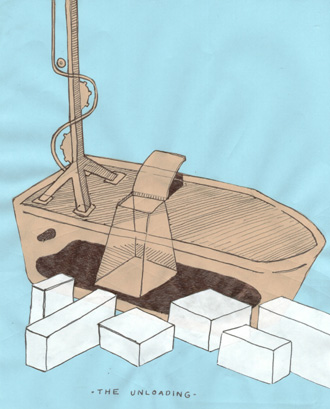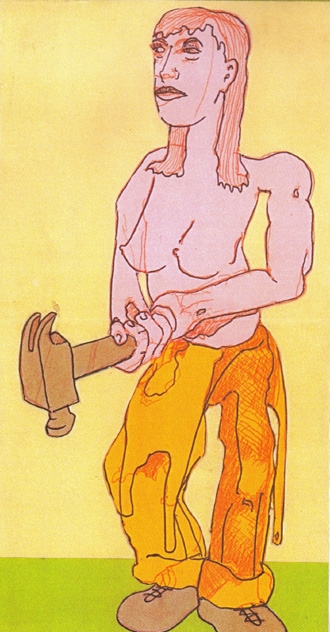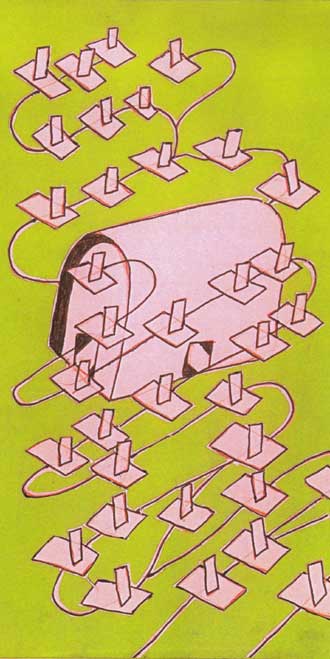“In the Blink of an All Seeing Eye”
16.10.06
 Vic Graburn is so famous that if this story were true you would have heard of him. You would have seen him on a spin-off of Entertainment Tonight or read his name in the opening credits of one of his films.
Vic Graburn is so famous that if this story were true you would have heard of him. You would have seen him on a spin-off of Entertainment Tonight or read his name in the opening credits of one of his films.
Vic Graburn first attracted the attention of the studio system after directing a series of highly successful multi-language ad spots for Nabisco and Ford Explorer. The ads avoided culturally specific signifiers, instead taking aim at a universal target demographic; relying on voice-over narration rather than on-screen dialogue in order to facilitate translated re-dubbing. The commercial for Nabisco eventually aired in a staggering 37 countries.
In Hollywood circles, Vic Graburn is known as "The Oversear" because his films, despite being test-marketed among American audiences, have consistently tended to gross far more foreign, rather than domestic, box office receipts by an enormous margin. If they had been released only domestically, most of his films would have been financial disasters, but once international ticket sales were tabulated, they instead recouped their initial investment several times over.
His critics often mistakenly assume that anyone who makes films with that many guns in them – and I can assure you there are a lot of guns in Vic Graburns movies – must be a person of strictly lowbrow taste. I am lucky enough to be a close personal friend of Vic’s and I can assure you that this is false.
Vic loves ballet, classic silent films, pantomime and comic books. No one loves non-verbal narrative as much as Vic Graburn. No one else is as excited about the ability of art that is not rooted in language to communicate across national, cultural and linguistic barriers.
I first met Vic when my law firm successfully litigated a breach of contract suit he had filed in relation to his film The Leverage Point. Afterwards he treated me to a performance by the national ballet company of the Czech Republic. Despite being woozy from jet lag and slaking down Coca-Cola, the elegant Eastern European dancers still managed tightly wound spins in toe shoes. As he watched Vic became so exhilarated by the trans-cultural, non-verbal possibilities that he pulled a large black permanent marker from his satchel and began redacting all of the dialogue except for the boy’s clubby one-liners from a copy of the script for the sequel to his film A Man Above. Within a ten-foot radius of our seats, irritated patrons of the arts glanced around the dimly lit auditorium trying to find the source of the fumes.
 On Wednesday I faked a business lunch with a client, knocked off early for the afternoon and went down to the garment district to meet Graburn. Once a week near the Long Beach port, vendors sold art smuggled in from abroad. Commercial shipping lines often supplemented their revenue by packing small-scale objets d’art into the nooks and crannies of unused storage space on the freighters that brought produce up from the mini-countries to the south or brought cars from humid East Asian factories, and these objects regularly appeared at the Long Beach flea market. Partially in defiance of his critics’ assumptions as to his unrefined taste, following his initial financial success Graburn had crafted himself as an expert collector of third world art.
On Wednesday I faked a business lunch with a client, knocked off early for the afternoon and went down to the garment district to meet Graburn. Once a week near the Long Beach port, vendors sold art smuggled in from abroad. Commercial shipping lines often supplemented their revenue by packing small-scale objets d’art into the nooks and crannies of unused storage space on the freighters that brought produce up from the mini-countries to the south or brought cars from humid East Asian factories, and these objects regularly appeared at the Long Beach flea market. Partially in defiance of his critics’ assumptions as to his unrefined taste, following his initial financial success Graburn had crafted himself as an expert collector of third world art.
When I arrived Graburn was fully absorbed, examining a display of Guatemalan worry dolls on a rectangular folding table. Made from colorful string wrapped around wire armatures, the dolls had tiny price tags pressed over their eyes like little blindfolds; their wire arms groping blindly outward. Graburn picked one up, pointed it at me and, well within earshot of the vendor, demanded, "Promise me you’ll never buy this kind of junk." He tossed it back onto the table where it skittered across the faux wood laminate and collided with its cohorts.
Reflexively, he snapped his head back to look at me and flicked the collar of my shirt. "What the hell are you wearing, man?" Vic demanded, "You’ve got to dress down for something like this. You show up wearing that monkey suit and suddenly all these guys are going to double their prices." Hair furred the V exposed by the unlatched top button of his short sleeved pink shirt. I hadn’t thought to change after working the morning at the firm.
Graburn was so square jawed, that his flared, expansive mandible obscured all but the outermost edges of his ears. His skin was the pink stucco of beachfront property and now it was baking in the sun-starched corrugated tin alleyways of the garment district. I am the owner of a deep and abiding tan and the skin that is stretched taut across my cheek bones is an extra shade darker. I wasn’t fazed by the sun’s nuclear gift.
Vic walked past a police barricade blocking off the next intersection and I followed him into the crowd browsing down the center of the narrow, closed off street. Vendors had built PVC tubing structures covered with acrylic tarps onto the backsides of their mini-vans and hatchbacks to create sales booths. Battery powered dogs chirped amidst the bogus jewelry and plastic watches. A woman sold hand drums ranging in size from about that of a coffee can to nearly that of a 42 gallon barrel of oil. Graburn feigned licking his finger and pressed it against one of a tableful of, presumably stolen, outmoded cell phones. "Sssss!" he said and jerked his hand back, waggling his pretend burnt finger at me with a mock sorrowful expression and then grinned.
Graburn held up a carved wooden crescent shape from a grid of trinkets arranged across a fabric-draped display table. "See this? It’s a ceremonial dagger,” he said, pulling the knife from its sheath and running his finger along its edge. “It’s not for cutting or stabbing, the blade is intentionally dull.” He flipped the iron knife’s wooden holster over in his hand. “This one was clearly designed for export sales and tourists. Observe the cross-hatched pattern on its sheath: loose, sloppy. The authentic carving would have a tighter, more intricate pattern. When the Igbo make daggers for their own community, the stipple pattern interlaces itself again and again. Cultural artifacts made for export, such as this, are, more often than not, worthless––caricatures of themselves, built on broad comedy and broader brushstrokes.”
He handed over his Visa and there was the crack of a pre-electronic carbon paper machine. I was confused that he would purchase an item which he had just critiqued as trash and sent him a questioning look. "It’s a gift for the senior v.p. for west coast marketing and publicity,” he explained. “He might be able to tell the difference between a good and bad billboard location, but he’s not the type that can appraise the quality of traditional sub-Saharan craftwork. You don’t serve beluga caviar at pre-school snack time.” Pressing his finger against the tip of the knife, he added, “This one does have one added tourist attraction: the point is razor sharp. He can use it as a letter opener."
 Staring at the carbon paper and indicating where it ought to be signed, the salesman was visibly excited and nervous. "You must be the Vic Graburn. Can I tell you how much we love your movies in Nigeria."
Staring at the carbon paper and indicating where it ought to be signed, the salesman was visibly excited and nervous. "You must be the Vic Graburn. Can I tell you how much we love your movies in Nigeria."
"Really," Graburn said with a passing interest, "How much do you love them?"
"Oh, the very, very best. Your movie Crunch Time: Of all the big, amazing, huge American blockbusters, yours is the biggest, hugest, most amazing block destroyer of them all! It busted up big blocks among the men in Maiduguri and the women some of them liked it, too, but not as much as the men. It reminds us of what was good about the war now that we have made peace with the secessionists. Now we watch the film together with the men from the south and cheer the explosions together. Your movies helped us make peace and have steeled our resolve for our new fight against the men from the north.”
"Thanks," Graburn said, raising his shopping bag in a salute and turning to go.
"Wait!” the vendor said, “For a man like you I have something special. Things I don’t sell to just anyone. Because you are a man of quality I will sell you things of great quality."
The vendor pulled a cardboard box from beneath the table and set it before us. Dalkon Shield® IUDs had been bent and painted to look like animals of the grasslands: dik-diks and lemurs. The contraceptives’ long dangling strings had been stiffened with wheat paste to form the creatures’ tails. Cans of Similac infant formula had been cut and folded into toy canoes and tiny tin perambulators with the printed gold ribbon squirreling around their exteriors and one ear of the teddy bear logo peaking up into the prow of the boat.
"I haven’t seen much like these in the catalogs or collector’s auctions,” Graburn said. “These are rather unique." He gazed on them with genuine appreciation and purchased the entire set.
"Thank you, Mr. Graburn,” said the salesman. “It is an honor to pass these objects into your commanding possession."
"Man, that guy was a real gentleman," Graburn said to me as soon as we were back amidst the throng of the crowd, "A real high-class guy."
 He fondled a dik-dik out of the shopping bag. "All these liberals who supposedly love the third world sooo much, they accuse me of making violent, escapist clap-trap. But you know what? Meryl Streep weepies don’t get half the box-office sales in Nigeria that my pictures get. Do you know why? Because the world is at war. Everywhere. All the time. Endlessly. My gun-toting escapism has far more to do with these people’s lives than a dying pale hairless Meryl Streep’s relationship with her radiation oncologist. These people don’t have doctors. When people die there, they die fast not slow. I have more to do with their lives – guns, violence, manhood – than all the interpersonal relationships with radiation oncologists put together. Everywhere is at war and everywhere just happens to be these critics’ biggest blind spot."
He fondled a dik-dik out of the shopping bag. "All these liberals who supposedly love the third world sooo much, they accuse me of making violent, escapist clap-trap. But you know what? Meryl Streep weepies don’t get half the box-office sales in Nigeria that my pictures get. Do you know why? Because the world is at war. Everywhere. All the time. Endlessly. My gun-toting escapism has far more to do with these people’s lives than a dying pale hairless Meryl Streep’s relationship with her radiation oncologist. These people don’t have doctors. When people die there, they die fast not slow. I have more to do with their lives – guns, violence, manhood – than all the interpersonal relationships with radiation oncologists put together. Everywhere is at war and everywhere just happens to be these critics’ biggest blind spot."
We heard the distant clack, clack of people flipping through silver disks in hard plastic cases and walked over to peruse the racks of bootleg DVDs. Our pink fingers smudged the exhaust residue on the shrink-wrap as we browsed through the cases, each one identified by a black and white Xeroxed miniature version of the promotional movie poster. Graburn pulled one disc from the row of cases and angrily smacked it against the tops of its brethren.
"Goddammit."
It was a copy of Graburn’s forthcoming production Undone, which wasn’t slated for release for two weeks and yet had already been leaked and duplicated.
Aware of the importance of documentation, I snapped a series of camera-phone pictures of the kiosk and its proprietors and advised Graburn to purchase the DVD as evidence. He did so with barely concealed rage. When he demanded a receipt, he received only a blank stare until something was eventually sketched on a scrap of paper in foreign characters.
 As was typical of these flea market sales booths, operations were run out of the back of a vehicle parked behind the kiosk, this time with the DVD overstock filling the bed of the pickup truck. For ease of unloading, the tailgate hung open and the glass flap of the camper shell yawned upwards. Because merchandise obscured its rear license plate I walked around to the front of the truck to jot down the number. Crouched and scribbling the final digits, I looked up to see Graburn pull the dagger from his shopping bag and stab the truck’s rear tire.
As was typical of these flea market sales booths, operations were run out of the back of a vehicle parked behind the kiosk, this time with the DVD overstock filling the bed of the pickup truck. For ease of unloading, the tailgate hung open and the glass flap of the camper shell yawned upwards. Because merchandise obscured its rear license plate I walked around to the front of the truck to jot down the number. Crouched and scribbling the final digits, I looked up to see Graburn pull the dagger from his shopping bag and stab the truck’s rear tire.
He withdrew the blade from the black rubber and I jogged up, slapped him on the shoulder and, fearing police or paparazzi, forced him to dash off through the maze of vendors. Graburn was giddy from his stunt and I realized the discrepancy in our responses: my sense of urgency compared to his. Mildly illegal behavior was potentially an asset to the public persona of a creative venture capitalist like Graburn perpetually on the periphery of the public eye, whereas it could be a serious impediment to the career of a legal professional such as myself.
As we ran, the rattling of the Similac cans inside Graburn’s shopping bag resounded even amidst the noisy flea market. The steel-belted radial had been quietly hemorrhaging PSIs and the bed of the pickup truck began to sag. We had sprinted a good block and a half before it drooped to such an angle that, like some epic dam bursting in one of Graburn’s movies, bootleg DVDs began to slide down its incline, loudly clattering into the gutter.
Glancing over my shoulder, I extracted my car from its tiny parallel parked crevice. Graburn unlatched his laptop, barcalounged the screen into position, and inserted the disc with his film’s title Sharpie’d across it. Without headphones, the MGM lion roared silently in a tiny pop-up window, but, as a low resolution version of his film appeared, Graburn growled and punched my dashboard. "Never have I been so upset to get what I actually paid for." Albeit for different reasons, Graburn for once watched one of his own films with the same level of disgust and horror as his critics.